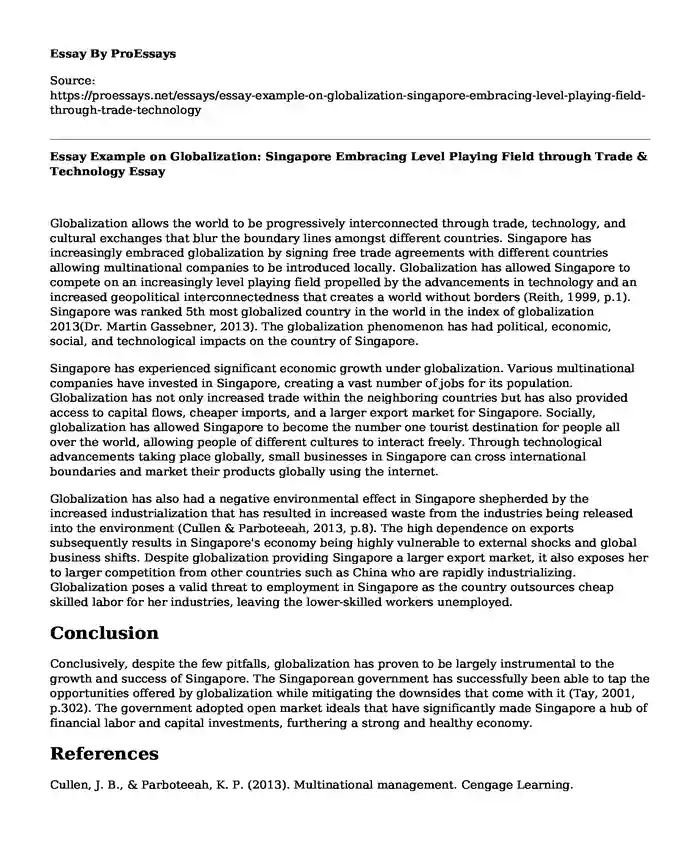Globalization allows the world to be progressively interconnected through trade, technology, and cultural exchanges that blur the boundary lines amongst different countries. Singapore has increasingly embraced globalization by signing free trade agreements with different countries allowing multinational companies to be introduced locally. Globalization has allowed Singapore to compete on an increasingly level playing field propelled by the advancements in technology and an increased geopolitical interconnectedness that creates a world without borders (Reith, 1999, p.1). Singapore was ranked 5th most globalized country in the world in the index of globalization 2013(Dr. Martin Gassebner, 2013). The globalization phenomenon has had political, economic, social, and technological impacts on the country of Singapore.
Singapore has experienced significant economic growth under globalization. Various multinational companies have invested in Singapore, creating a vast number of jobs for its population. Globalization has not only increased trade within the neighboring countries but has also provided access to capital flows, cheaper imports, and a larger export market for Singapore. Socially, globalization has allowed Singapore to become the number one tourist destination for people all over the world, allowing people of different cultures to interact freely. Through technological advancements taking place globally, small businesses in Singapore can cross international boundaries and market their products globally using the internet.
Globalization has also had a negative environmental effect in Singapore shepherded by the increased industrialization that has resulted in increased waste from the industries being released into the environment (Cullen & Parboteeah, 2013, p.8). The high dependence on exports subsequently results in Singapore's economy being highly vulnerable to external shocks and global business shifts. Despite globalization providing Singapore a larger export market, it also exposes her to larger competition from other countries such as China who are rapidly industrializing. Globalization poses a valid threat to employment in Singapore as the country outsources cheap skilled labor for her industries, leaving the lower-skilled workers unemployed.
Conclusion
Conclusively, despite the few pitfalls, globalization has proven to be largely instrumental to the growth and success of Singapore. The Singaporean government has successfully been able to tap the opportunities offered by globalization while mitigating the downsides that come with it (Tay, 2001, p.302). The government adopted open market ideals that have significantly made Singapore a hub of financial labor and capital investments, furthering a strong and healthy economy.
References
Cullen, J. B., & Parboteeah, K. P. (2013). Multinational management. Cengage Learning.
Tay, S. (2001). ISLAND IN THE WORLD: Globalization and Singapore's Transformation. Southeast Asian Affairs, 279-309.
Reith. (1999). BBC Lecture on Globalization [pdf document].
Cite this page
Essay Example on Globalization: Singapore Embracing Level Playing Field through Trade & Technology. (2023, Sep 11). Retrieved from https://proessays.net/essays/essay-example-on-globalization-singapore-embracing-level-playing-field-through-trade-technology
If you are the original author of this essay and no longer wish to have it published on the ProEssays website, please click below to request its removal:
- Government Resolution to Market Failure Considering Core Values of Community and Dignity
- Is NAFTA Beneficial or More Harmful to the United State Economy?
- Life Without Phones: A Device-Free Class Experience - Essay Sample
- Research Paper on China-US Trade War: Unfair Trading Activities & Tariff Barriers
- Capitalism & Slavery: Exploring the Interconnections - Essay Sample
- Cell Phones: Controlling Humans or Humans Controlling Cell Phones? - Essay Sample
- Exploring Religion & Globalization: Understanding Their Impact on Life







